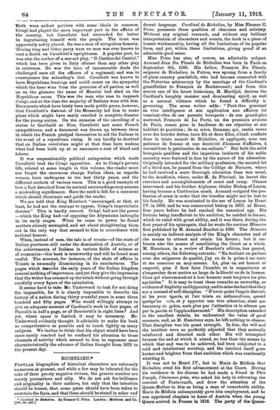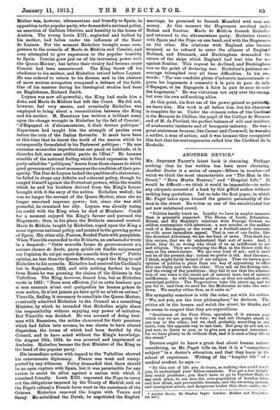RICHELIEU.* POPULA.R biographies of historical characters are extremely numerous at
present, and while a few may be tolerated for the sake of their purely negative virtues, the greater number are merely pretentious and silly. We do not ask for brilliance and originality in their authors, but only that the intention should be honest, that some pains should have been taken to ascertain the facts, and that these should be stated in sober and
* Cardinal de Itiohetieu, By Eleanor C. Price. London : Methuen and Co. [10s. 6d. Inet.1
decent language. Cardinal de Biehelieu, by Miss Eleanor C. Price, possesses these qualities of clearness and sobriety. Without any original research, and without any brilliant interpretation of characters and events, the book is a piece of honest workmanship, having all the limitations of its popular form, and yet, within these limitations, giving proof of an admirable good sense.
Miss Price has also, of course, an admirable subject. Artnand Jean Du Plessia de Richelieu was born in Paris on September 9th, 1585. His father, Francois Du Plessis, seigneur de Richelieu, in Poitou, was sprung from a family of plain country gentlefolk, who had become connected with the Poitevine aristocracy by the marriage of the Cardinal's grandfather to Francois de Rocheconart; and from this source one of his latest historians, M. Mariejol, derives the Cardinal's haughty manner and dominating spirit, as well as a natural violence which he found a difficulty ir governing. The same writer adds : " Peut-otre pourtant sa vive intelligence et son application aux affaires lui venaient-elles de sea parents bourgeois : de son grand-pere maternel, Francois de La Porte, un des premiers avocets de Paris, connu pour la hardiesse de sea reparties et son habileto de praticien ; de sa mere, Suzanne, qui, restee veuve avec des lourdes dettes, trois fils et deux filles, s'etait confinee dims la triste manoir de Richelieu, et appliquee, avec une patience de femme et une dexterite d'homme d'affaires, is reconstituer le patrimoine de see enfants." But both the solid bourgeois qualities and the imperious instincts of his noble ancestry were fostered in him by the nature of his education. Originally intended for the military profession, the natural lot of a third son, he passed from the College de Navarre, where he had received a more thorough education than was usual, to the Academie, where, under 141. de Pluvinel, he learnt the exercises and accomplishments of court and camp. Chance intervened, and his brother Alphonse, titular Bishop of Lucon, having become a Carthusian monk, Armand resigned the pro- fession of arms in order that the benefice might not be lost to his family. He was nominated to the see of Lucon by Henri IV. in 1606, and he was consecrated bishop in 1607, at Rome, four years before he had reached the canonical age. His fortune being insufficient to his ambition, he resided in his see, which he ruled with great ability, and it was there, during the first years of his episcopate, that he wrote the curious Memo ire first published by M. Armand Baschet in 1880. The Memoire is mainly an indirect analysis of the King's character and of the means to attract and retain his favour ; but it em- braces also the means of conciliating the Court as a whole. M. Hanotaux, in a review of Baschet's edition, has quoted, among others, the following extracts: "En traitant on parlant avec des seigneurs de qualite, j'ay eu de la peine is me tenir et me resserrer en moy-mesme. La, plus on eat honore et respecte, plus il faut faire Mumble et le respectueux et s'empescher de se mettre au large de la liberte on de la licence. Ceux qui s'accommodent it leer humenr sont toujours les plus
agreables." It is easy to treat these remarks as unworthy, as evidence of duplicity and hypocrisy, and to miss the fact that they are a counsel of self-discipline. "N'avoir point l'esprit distrait, ni les yeux egares, ni l'air triste on melancolieue, quand quelqu'un etrle, et y apporter tine vive attention, ainsi que beaucoup de grace, mais plus par l'attention et le silence qua par la parole et l'applandissement." His description extended to the smallest details, he understood the value of good manners, and, as M. Hanotaux says, he left nothing to chance.
That discipline was his great strength. In him, the will and the intellect were so perfectly adjusted that they mutually reinforced and directed each other. His will triumphed because the end at which it aimed, no less than the means by which that end was to be achieved, had been subjected to a cold and intellectual scrutiny, and the intellect itself grew keener and brighter from that ambition which was continually whetting it.
It was not to Henri IV., but to Marie de Medicis that. Riehelien owed his first advancement at the Court. During his residence in his diocese he had made a friend in Pere Joseph, l'eminence grise, who asked his help in reforming the convent of Fontevranit, and drew the attention of the
Queen-Mother to him as being a man of remarkable ability. Marie de Medicis subsequently gave him employment, and be was appointed chaplain to Anne of Austria when the young Queen arrived in France in 1616. The party of the Queen.
Mother was, however, nitramontane and friendly to Spain, in opposition to the popular party, who demanded a national policy. an assertion of Gallican liberties, and hostility to the house of Austria. The young Louis XIII., neglected and bullied by his mother, had fallen under the influence of the Sieur de Luynes. For the moment Richelieu brought some corn. petence to the councils of Marie de Medicis and Concini, and even attempted to give expression to the popular hostility to Spain. Concini grew jeal .us of his increasing power with the Queen-Mother ; but before their rivalry had become acute Concini had been assassinated. The King threw off his obedience to his mother, and Richelieu retired before Luynes. He was ordered to return to his diocese, and in the absence of more serious occupation composed a defence of the faith. One of his masters during his theological studies had been an Englishman, Richard Smith.
Luynes was now all-powerful ; the King had made him a duke, and Marie de Midiois had left the Court. He did not, however, feel very secure, and eventually Richelieu was employed to bring about a reconciliation between the King and his mother. M. Hanotaux has written a brilliant essay upon the change wrought in Richelieu by the fall of Concini : d'Espagnol et d'ultramontaine, ii etait devenu politique." Experience had taught him the strength of parties even before the ruin of the Italian favourite. It must have been at this time that he learnt the truth of the maxim which he subsequently formulated in his Testament politique : "En tine ancienne monarchie imperfections ont passe en habitude, et le IrMsordre fait, non sans ntilite, partie do l'Etat." He became sensible of the national feeling which found expression in the Tarty called the "politiques," drawn from those classes to which good government is most necessary as the condition of their pro- sperity. The Due de Luynes lacked the qualities of a statesman; he failed to shape any definite and coherent policy, though be ranged himself against the Protestant powers, while the wealth which he and his brothers derived from the King's favour brought with it the envy of the nobles. Richelieu waited ; he was no longer the servant of the Queen-Mother, since she no longer exercised supreme power ; but, since she was still powerful, he remained her ally. Luynes was already losing his credit with the King when he died at Monheur. Conde for a moment enjoyed the King's favour and pursued the Huguenots ; then, in his place, the Bridarts assumed control. Marie de Medicis, taught by Richelieu, urged upon the King a more vigorous national policy, and pointed to the growing power of Spain. His other ally, Fancan, flooded Paris with pamphlets. When Vieuville succeeded to the Brillarts, an ambassadorwrote in a despatch : " Cette nouvelle forme de gouvernement n'a a ucune chance de duree, parce qu'elle eat fondee uniquement sur l'opinion du roi qui recoit des conseils bien divers." Public opinion, no less than the Queen-Mother, urged the King to call Richelieu to his councils. Richelieu had received his Cardinal's hat in September, 1622, and with nothing further to hope from Rome he was pressing the claims of the Grisons in the Yaltelline. The King, however, feared him, but as Richelieu wrote in 1622 : " Dana mon affliction j'ai en cette bonheur que si rues ennemis m'ont oste quelquefois lea bonnes grazes de mon maitre, us n'ont jamaia pu faire qu'il ne m'efit en estime." Vieuville, finding it necessary to conciliate the Queen-Mother, eventually admitted Richelieu to the Council as a consulting Minister, by which he intended that Richelieu might share the responsibility without enjoying any power of initiative. But Vieuville was finished. He was accused of doing busi- ness with financiers, the nobles clamoured for their pensions which had fallen into arrears, he was shown to have altered dispatches, the terms of which had been decided by the Council, and to have acted without the King's knowledge. On August 13th, 1624, he was arrested and imprisoned at Amboise. Richelieu became the first Minister of the King as the head of the popular party.
His immediate action with regard to the Valtelline showed his consummate diplomacy. France was weak and unsup- ported by any alliances. Policy demanded that there should be no open rupture with Spain, but it was permissible for any nation to assist its allies against a nation with which it remained friendly. Louis XIII. requested the Pope to carry out the obligations imposed by the Treaty of Madrid, and on the Pope's refusal a French force went to the assistance of the -Grisons. Richelieu renewed the league with Venice and Savoy. Me subsidized the Date'', he negotiated the English
marriage, he promised to furnish Mansfeld with men am. money. At this moment the Huguenots revolted undet Rohan and Soubise. Marie de Medicia forsook Richelita. and returned to the ultramontane party. Richelieu treateu with Spain and the Pope on one hand, and with the Huguenots on the other. His relations with England also becalu. strained, as he refused to enter the alliance of Englaad Holland, and Denmark, and Buckingham demanded tla return of the ships which England had lent him for use against Soubise. This request he declined, and Buckingham was on the point of declaring war. Richelieu's patience and courage triumphed over all these difficulties. In his owa words : "Par une conduite pleine d'industrie inac,coutumee porta les huguenots 6. consentir la pair de peur de eellt- d'Espagne, et lea Espagnols faire la pair de peur de celle des huguenots." He was victorious not only over the enemy. but over his own self-seeking allies.
At this point, his first use of the power gained so patienbly, we leave him. His work is all before him, but his character is complete for us. Under the crimson robes of the Cardinal is the Marquis de Chillon, the pupil of the College de Navarre and of M. de Pluvinel, the perfect balance of will and intellect, of aristocratic instincts and of bourgeois industry. He was a great statesman because, like Caesar and Cromwell, he was also a soldier, a man of action; and it was because they recognized this fact that his contemporaries called him the Cardinal de in Roehelle.











































 Previous page
Previous page